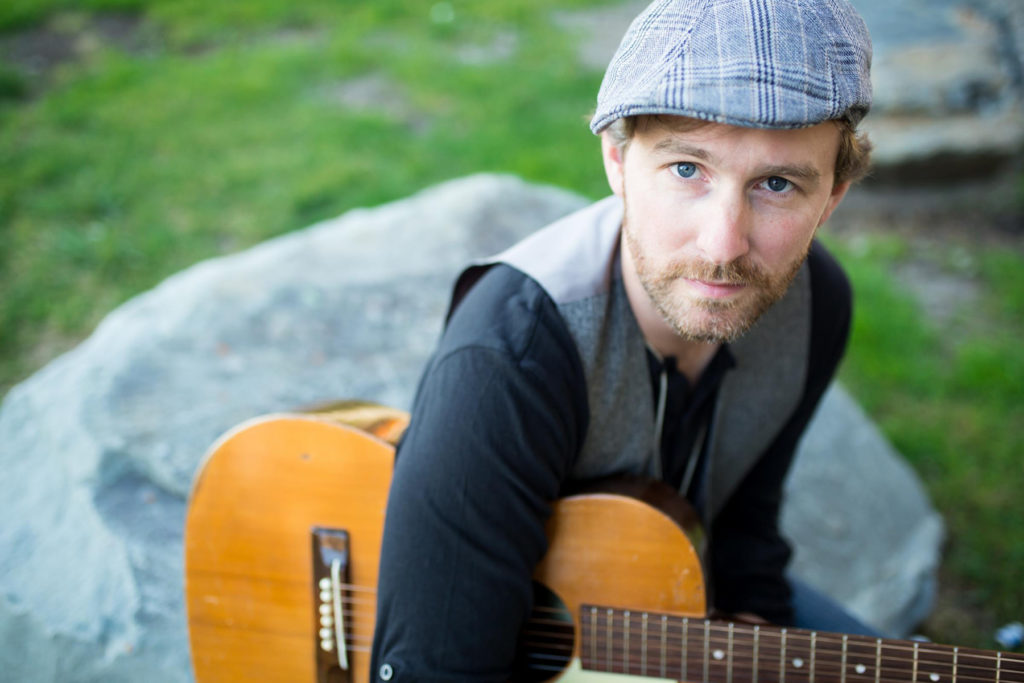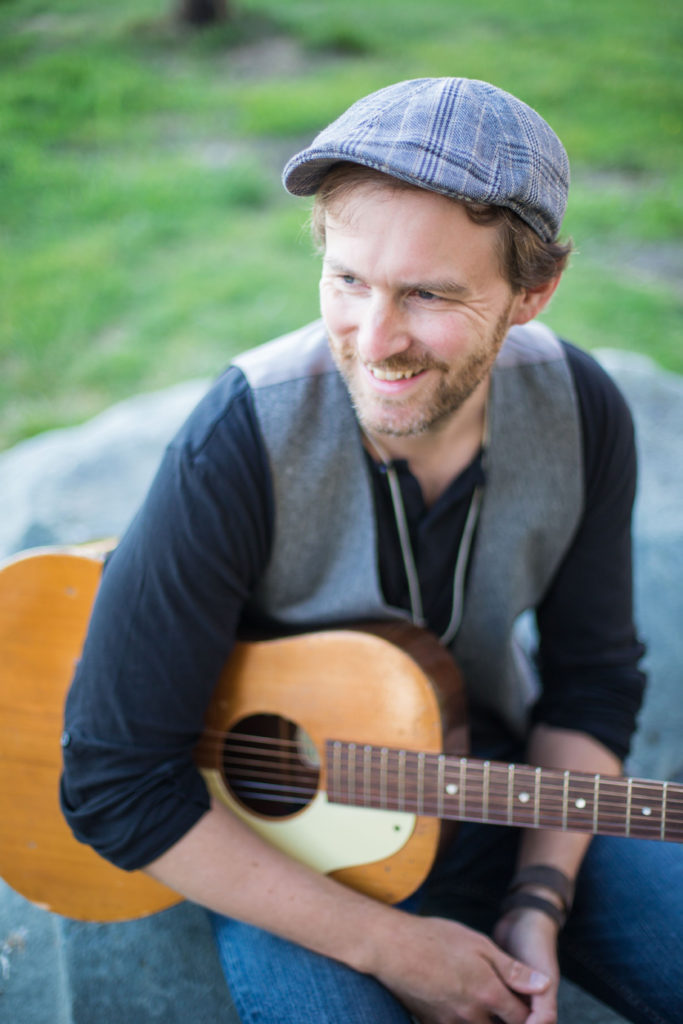Armed with a guitar, a saxophone and a velvety voice, singer-songwriter Ian Sherwood is a natural on stage, combining his witty banter with masterful musicianship into songs that dance the line between folk and pop.
“Music was something I kind of always did,” Sherwood said. “That was my sport, growing up. Kind of like a kid deciding to be an astronaut, I just decided that music is what I wanted to do. I want to stand in front of an audience on stage and entertain people with songs that I’ve written.”
So, he remembered thinking, “I guess I better write some songs.”
Now an accomplished musician and songwriter, Sherwood was named Contemporary Singer of the Year in 2013 by the Canadian Folk Music Awards, Best Male Artist of the Year in 2012 by the International Acoustic Music Awards, and in both 2008 and 2010, he was Music Nova Scotia’s Musician of the Year.
Ahead of his Friday, April 8 performance, Sherwood spoke with the Wortham Center staff about his lifelong passion for music, his journey in songwriting, his use of guitar pedals and saxophone in folk — and about the mysterious portal between Asheville and Nova Scotia.
How did you discover your talents as a songwriter? Was it something that’s always kind of come naturally to you—
Oh my gosh, no. [Laughs]
—or was there a moment where one of your songs just “clicked” for you?
I think mostly it was ego that kept me going. [Laughs] I look back at some of my earlier songs, and I wonder: Oh my gosh. How did that turn that into what I’m doing now? I think I always sort of felt like I had something to say — and I didn’t care how good or bad it was. It just never felt like something that I couldn’t do. I felt like, if I put enough work into it, I can do this. And then eventually it just became the thing I was doing.
Well, you’ve since won several awards for your songwriting, so it seems to be working! What’s the songwriting process like for you? How can you tell when you’ve really got something?
Honestly, it’s really in retrospect. In the moment, I kind of always have the same feeling about songs, and I’m not thinking about whether they’re good or bad. You’ll never finish a song if you’re sitting around deciding whether it’s worth it while you’re writing it. If you’re writing it, then it’s worth it. Maybe you won’t show it to anyone or play it for an audience, and that’s fine.
You know, the first gig I ever did as a songwriter: I was hired to play at a restaurant, and they wanted me to play two 45-minute sets. But, at the time, I had only written about three to four songs. So up until that show, I had to write every single day. And when I got to the restaurant on the day of the show, I had to play absolutely everything that I had written to fill the time — plus a couple cover songs. And that was scary, and I probably played a lot of songs that people didn’t really respond to. But it was such a good way to cut your teeth, as people say.
How would you describe your music? What genre or genres best fit your sound?
That’s really hard. I guess it’s folk-pop. Basically, I always try to write interesting, thoughtful lyrics and match it to what I’m doing instrumentally. The theme might be as simple as “I’m heartbroken,” or I’m feeling this way or that way, but I try to say it in a new and interesting way. And the music written around that has a kind of folk feel, made contemporary by adding instruments that you wouldn’t necessarily think of in folk — things like saxophone and guitar pedals. I’d say that, if you’re a fan of James Taylor or Chris Stapleton or even Ed Sheeran, you might like me.
How has your music or your sound evolved over time?
Hmm… Well, early songwriting Ian Sherwood probably was just writing from the heart. Whether or not it made sense to other people wasn’t really what I was thinking about. But what you end up realizing is: Sometimes that doesn’t mean anything to anyone other than you. It’s just kind of like ripping a page out of your diary and reading it on stage. But part of the point of songwriting is communicating things with your audience, and it’s important to create something that other people will respond to.
I’d say that, if you’re a fan of James Taylor or Chris Stapleton or even Ed Sheeran, you might like me.
Ian Sherwood
Well how do you get to that point — where you’re not just singing your diary entries on stage?
I teach at a lot of songwriting camps, and a lot of my students are in high school, and they’ll often write songs that are so personal that they won’t even share it with anyone. And that’s fine; art doesn’t have to be for other people. But the choice to have your art be something for other people to appreciate is the other half of the equation. And it’s a hard thing to get to. It’s very common when you first start writing to only write for yourself. It’s such a vulnerable experience, to write a song — and you become so attached to it, especially early on. But you have to learn to step outside of your writing and imagine someone else experiencing it — and then learn to rewrite it and craft it and let go of some things that other people may not understand. And to not be too attached. Learning to get past that is a tough thing.
What have you been working on lately?
Well, honestly, the pandemic basically put everything on hold for me. In April 2020, we had a mass shooting here in Nova Scotia — it was the worst mass shooting in Canadian history — and it happened right at the beginning of the pandemic. And then the Black Lives Matter movement started a really important discussion, and I just felt like — as a white male cisgender heterosexual dude — I didn’t need to have a voice right now. People didn’t need to hear from me in that moment. So I stopped playing music. And, for a while, I just kind of lost all the motivation with it entirely, honestly.
I was just hanging out with my family — renovating our house, making kombucha and sourdough bread— waiting for my joy around music to come back. And it took a while, but I really do feel like, creatively, my heart is coming back to me after all that’s happened. So, for the last four or five months, I’ve been writing quite a lot and I’ve been in the studio quite a lot. There are a couple new records coming — a live-looping record, a pared down record that I recorded in my studio at my house, and a full-band record as well. A lot of music is coming, and I’m really excited for it.
So, you mentioned live-looping, and I actually wanted to ask about that: One of my favorite videos of yours is the “Oh Mary, Don’t You Weep” live performance, where you created a full-band sound by looping different saxophone lines a few times and then playing guitar and singing over it. That takes so much skill to do live. Is that something that’s a regular part of your performances?
Yeah, it happens quite a lot, actually. I play a couple of different instruments, so when I can’t have a full band with me, I bring the looper — and it’s become kind of a thing for me because of that. [NOTE: A loop pedal is an electronic device that creates instant recordings of a musical performance and plays those recordings back in real-time. This allows a musician to begin overdubbing themselves to create a vast, polyphonic soundscape based on their own performances in the room.]
Even when it’s just me alone on stage, I want my shows to be something really special. So I started learning to use a looping pedal to build up the sound, and now I use it even when I do have a full band with me. It’s something I do quite a lot — and it’s something I’m planning to do in Asheville.
Can you explain a little about how the looping effect works?
It’s kind of like another instrument, really. It takes a lot of practice and patience. It’s not like any other guitar pedal, where you turn on the chorus or the flanger or the distortion, and there it is. You have to have really good timing, because you have to be able to create a loop that is both good and is also perfectly in time with the song you’re playing.
And then, more than that, you have to be creative with it. If you just sit down and record a bunch of things on top of other things, it’s just going to sound like noise. At that point, you’re just using it as a novelty. Your song needs to be served by the loop, as opposed to it just being a flashy trick. When you bring out the looper on stage, the audience is only impressed by it once. So if you’re going to keep using it, it better be good. It better improve on the song in some way, because the novelty has already worn off.
Lastly, have you ever been to Asheville?
I’ve never been to Asheville, no. But I’m looking forward to coming down there.
Just curious, because I see a lot of Nova Scotian musicians performing here: Is there some sort of portal between Nova Scotia and Asheville, that you’re aware of? [Laughs]
So, we get a lot of presenters coming up to Nova Scotia from North Carolina, and a lot of North Carolina artists come up here to perform too. I have a lot of friends here who have specifically performed in North Carolina — not Georgia, not Tennessee, not Kentucky. Just North Carolina.
Actually, I can name more people that I know from North Carolina than I can name from Maine, and that’s a pretty close drive from here. So, [laughs], you’re right. I guess there is a strange portal between here and there.



